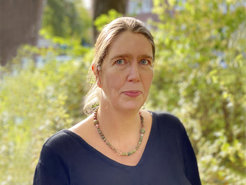Simone Kühn heads the new Center for Environmental Neuroscience
Considering climate change and environmental changes, her research is increasingly relevant
Simone Kühn is a new director at the Max Planck Institute for Human Development and will lead the Center for Environmental Neuroscience starting in July 2024. She continues the work of her Lise Meitner Group for Environmental Neuroscience at the institute. Her focus is on investigating the effects of the physical environment on individuals and their brains.

Our surroundings influence our well-being and mental health. For example, living in a city can increase the risk of mental illness, while living in nature is beneficial for mental health. For instance, a one-hour walk in nature reduces the activity of the amygdala, a brain region associated with stress (Sudimac, S., Sale, V., & Kühn, S. 2022).
However, it remains unclear which aspects of our environment—such as the green color, air pollutants, or sounds—have what impact on our mental health. It is also uncertain which of our senses plays the most important role in this context and which neural mechanisms are involved in processing the physical environment. Simone Kühn will now pursue these questions within the newly established Center for Environmental Neuroscience at the Max Planck Institute for Human Development: “I want to understand individuals in their context and find out what constitutes a healthy and stimulating environment for each person. We know far too little about this,” says Simone Kühn. “I am very excited to have the opportunity to continue my research with my research center at the Max Planck Institute for Human Development,” the neuroscientist continues.
Her research focuses on how different environments affect our lives at various times and over different time spans: from the effects of long-term living environments to short-term excursions or walks, to acute responses to specific environmental stimuli. In addition to outdoor environments, the indoors, and architectural features will also be examined, as individuals in our culture spend significantly more time indoors than outdoors. Extreme environments, such as Antarctica and prisons, are also subjects of study.
In addition to neuroimaging techniques, innovative methods such as georeferencing will be used, which allows objective characterization of living environments using maps, satellite images, and location data. This enables the researchers to estimate, for example, tree density in a certain area or average air pollution levels. Virtual reality will also be used to explore the research center’s questions. With its immersive nature, this technology is of great value to environmental psychology, as different aspects of the environment can be systematically varied.
Simone Kühn also plans to conduct longitudinal studies in collaboration with the Center for Lifespan Psychology at the institute to learn more about possible critical phases in life when the physical environment is particularly influential. Additionally, the research center will investigate how the environment affects the brains of genetically identical twins in twin studies. “This is an ideal test field to examine the relationship between the physical environment and brain structure, brain function, and mental health,” explains Simone Kühn.
“We have been collaborating with Simone Kühn on various projects for years and greatly appreciate her sense of innovative questions and her scientific excellence,” says Managing Director Ralph Hertwig. “Given climate change and the increasing alteration of living environments, a better understanding of the effects of the physical environment on humans is urgently needed,” Hertwig continues. The group’s findings could also help improve the design of physical environments, urban planning, and architecture to promote people’s mental health.
About Simone Kühn
Simone Kühn studied psychology at the University of Potsdam. She has long been associated with the Max Planck Society. The neuroscientist was a doctoral student at the Max Planck Institute for Human Cognitive and Brain Sciences in Leipzig. After postdoctoral positions at Ghent University in Belgium, University College London, and Charité – Universitätsmedizin Berlin, she led the “Mechanisms and Sequential Progression of Plasticity” group at the Center for Lifespan Psychology at the Max Planck Institute for Human Development from 2012 to 2016. She then took a Heisenberg professorship at the University Medical Center Hamburg-Eppendorf (UKE). In 2019, she returned to the Max Planck Institute for Human Development as head of the Lise Meitner Group for Environmental Neuroscience. Since July 2024 she is a Scientific Member of the Max Planck Society and Director at the Max Planck Institute for Human Development.
For more information about the Center for Environmental Neuroscience, visit the Center`s site.
Original publication












